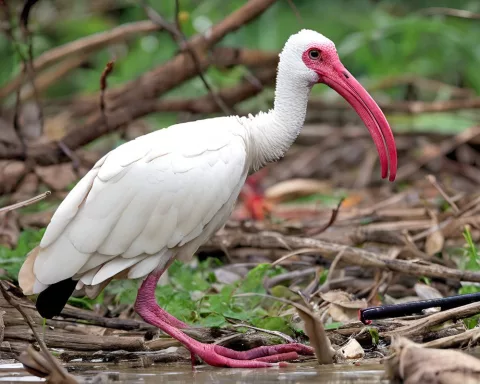South Africa will undergo a compulsory International Maritime Organisation (IMO) audit in November 2023, which will evaluate the country’s compliance with international maritime regulations and norms. The audit is part of South Africa’s commitment to accountability, safety, security, and environmental responsibility in maritime matters. The country’s active involvement in audits demonstrates its ambition to be a significant participant in global maritime affairs and enhance its maritime sector continually.
What is the International Maritime Organisation (IMO) audit in South Africa?
The International Maritime Organisation (IMO) audit is a compulsory audit according to the IMO Member State Audit Scheme (IMSAS) that South Africa will undergo in November 2023. The audit will evaluate South Africa’s compliance with international maritime regulations and norms, and will include a preliminary audit outcome report. South Africa’s active involvement in audits demonstrates its commitment to accountability, safety, security, and environmental responsibility in maritime matters.
Preparing for the International Audit
In a significant event scheduled for November 13, 2023, South Africa’s Minister of Transport, Ms. Sindisiwe Chikunga, will officially greet an auditing team from the prestigious International Maritime Organisation (IMO). The team, representing an agency of the United Nations known worldwide, will undertake a compulsory audit according to the IMO Member State Audit Scheme (IMSAS) in the Republic of South Africa.
South Africa has been an IMO member since 1995 and the organisation serves as a global regulator, encouraging responsible and environmentally conscious shipping practices worldwide. It goes beyond merely enforcing laws, creating a global maritime community that values safety, security, and environmental stewardship.
South Africa’s Department of Transport works hand in hand with the IMO. They ensure that international maritime regulations and norms are implemented within South Africa’s maritime jurisdiction. This spirit of cooperation is clear in South Africa’s adherence to International Conventions it is a signatory to.
Anticipation of the Upcoming Audit
The approaching IMSAS audit is not a first for South Africa. The country showed its dedication to global maritime norms by voluntarily participating in an audit in 2008. Following this, the IMO started compulsory audits in February 2016. This initiative includes a total of 113 audits, out of which 28 have been accomplished in African countries so far. South Africa, along with Benin, is one of the two African nations due for audits before the year-end of 2023.
IMO’s jurisdiction extends to several state entities in South Africa, such as the South African Maritime Safety Authority (SAMSA), an agency under the Department of Transport accountable for maritime administration. SAMSA is expected to be audited in this round.
The arrival of the auditors is planned at SAMSA Offices, situated at 154 Lunnon Rd, Hillcrest, Pretoria, at 09h00 on Monday, 13 November 2023. The minister’s speech to the IMO Member State Audit Scheme team will follow the reception. The week-long audit is expected to culminate in a preliminary audit outcome report.
Reflecting South Africa’s Commitment to International Standards
The media has been invited to document this historic moment in South Africa’s maritime history, aligning its practices with international norms. It demonstrates South Africa’s commitment to accountability and maritime safety as it welcomes examination from an international regulatory body.
The compulsory IMO audit, though significant, is part of a broader, ongoing interchange between South Africa and the international maritime community. Through its active involvement in audits and consistent compliance with conventions, South Africa continually reaffirms its adherence to safety, security, and environmental responsibility in maritime matters. This commitment, reflected in the actions of agencies like SAMSA and the Department of Transport, highlights the country’s ambition to be a significant participant in global maritime affairs.
The forthcoming audit is a notable milestone in South Africa’s maritime journey. The IMO’s scrutiny not only evaluates the country’s compliance with international norms but provides an opportunity for introspection and growth. The insights gained and recommendations made during these audits contribute substantially to the continual enhancement of South Africa’s maritime sector.
In conclusion, South Africa’s readiness to engage with international maritime regulations is praiseworthy. It’s dedication to safety, security, and environmental responsibility in maritime matters is inspiring. As South Africa awaits the IMO audit, there is a sense of anticipation and resolve to continue its journey towards becoming a symbol of maritime excellence on the African continent.
1. What is the International Maritime Organisation (IMO) audit in South Africa?
The International Maritime Organisation (IMO) audit is a compulsory audit according to the IMO Member State Audit Scheme (IMSAS) that South Africa will undergo in November 2023. The audit will evaluate South Africa’s compliance with international maritime regulations and norms, and will include a preliminary audit outcome report.
2. What is the purpose of the audit?
The purpose of the audit is to evaluate South Africa’s compliance with international maritime regulations and norms as part of its commitment to accountability, safety, security, and environmental responsibility in maritime matters. The audit is also an opportunity for South Africa to demonstrate its ambition to be a significant participant in global maritime affairs and enhance its maritime sector continually.
3. When will the audit take place?
The audit will take place in November 2023.
4. Will this be the first audit for South Africa?
No, South Africa voluntarily participated in an audit in 2008 and has undergone compulsory audits since February 2016. South Africa, along with Benin, is one of the two African nations due for audits before the year-end of 2023.
5. Which agency will be audited?
The South African Maritime Safety Authority (SAMSA), an agency under the Department of Transport accountable for maritime administration, is expected to be audited in this round.
6. What is the significance of the audit for South Africa’s maritime sector?
The audit not only evaluates the country’s compliance with international norms but provides an opportunity for introspection and growth. The insights gained and recommendations made during these audits contribute substantially to the continual enhancement of South Africa’s maritime sector.








